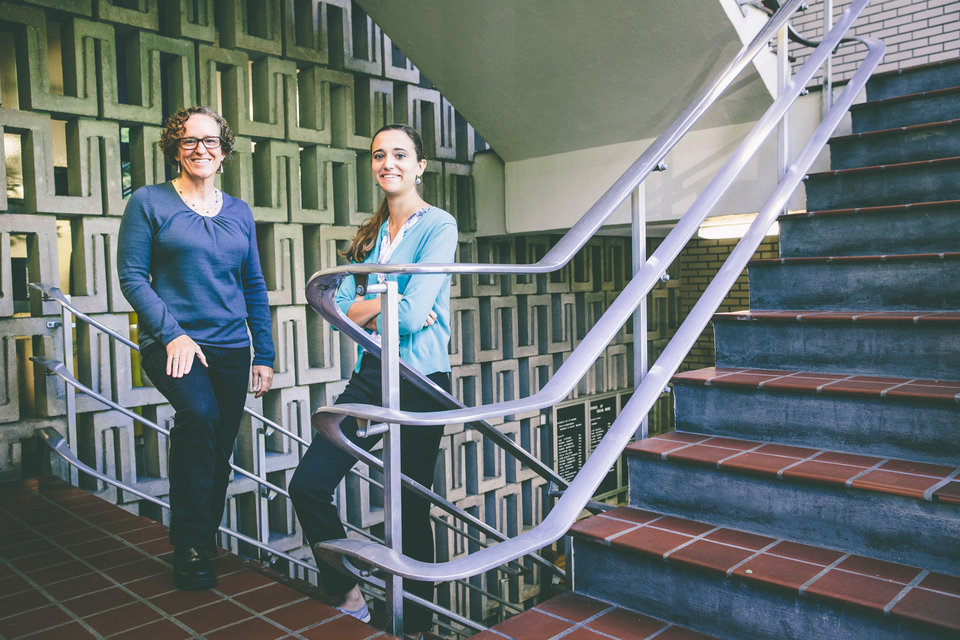Emily Titus ’16 came away from her Social Work Research class with a question: What helps refugees resettled in Minnesota to feel welcome? That question – paired with the skills she picked up in class and guidance from associate professor Ande Nesmith – launched a research project that Titus completed during her senior year.
Titus, who received a Collaborative Inquiry Grant, interviewed workers and volunteers from Lutheran Social Service of Minnesota (LSS) to discern what challenges refugees face and how to best help them overcome those challenges.
“She approached this from a very compassionate and caring attitude,” Nesmith said. “She really saw the onus of what happens to refugees and the community that’s welcoming them, and whether or not it is a welcome or not a welcome. I love the perspective instead of having the refugees prove themselves.”
Finding the problems
Titus had volunteered previously with LSS, where she had helped with classes that taught refugees everything from the alphabet to what they would need to know for a citizenship test.
“You get a different perspective and learn a lot about the different challenges [refugees] experience,” Titus said.
So, when Nesmith prompted her students to consider doing their own research, Titus answered the call. Nesmith said she encourages social work students to do research because many of them will end up working for nonprofits that value communication skills, particularly for writing grants or other funding means.
“It’s one thing to study it. … It’s a completely different ballgame to do it,” Nesmith said. “Especially with community-based research, which I really strongly believe in. It’s really the only kind of research I do or do with students, because they have to negotiate and work with an organization.”
To answer her question, Titus gathered the stories of five professionals and volunteers from LSS.
“I think stories can be powerful,” Titus said. “If you hear a statistic, it’s helpful. But when you hear an actual experience someone has, it’s a little more real. It can affect you in a different way.”
From these stories, Titus drew out themes: In the report she compiled, she outlined the main barriers refugees face and made four suggestions for how they could be overcome. She discussed the language and cultural barriers first. Next, all refugees have experienced trauma in some form – which Nesmith and Titus both emphasized.
“Refugees are immigrants who are traumatized,” Nesmith said. “They are entering the country because they had to. … They’re not coming at their best.”
Titus added that refugees often can't deal with their trauma even after being relocated because they’re so busy trying to navigate new systems.
Finally, Titus addressed isolation, whether physical – perhaps because of inability to travel – or social – perhaps because of negative stereotypes. Here was where Titus felt she learned the most; several participants discussed the negative impact the media's stories about refugees have.
“They were saying that one family had denied services from Habitat for Humanity because they were … nervous if [Donald] Trump got elected president, they would be deported because they were affiliated with this service,” Titus said. “When you think about things you hear in the media, put yourself in the place of the people they’re talking about. It’s not nice.”
And the solutions
Titus then turned to how these obstacles can be overcome. First, she said, increasing community involvement and the adjustment period for refugees would be beneficial.
“Hands down, the biggest thing was just reaching out. Volunteering,” Titus said. “There are so many different agencies and services you can volunteer with, like mentoring a family.”
Second, it would help for refugees to have a piece of their own culture here, such as familiar foods or religious services.
Titus’ final two suggestions were doing a better job educating refugees on American culture and society, and also educating Minnesota about refugees.
“We need to change the way we think or have been taught to think,” Titus said. “Being face to face with refugees who are new to Minnesota build[s] relationships.”
Titus sent her report back to LSS, and Nesmith said they are looking at spaces where they can present and publish this information.
“She identified really clear challenges and responses to those challenges,” Nesmith said in praise of Titus. “And, I have to say, I probably wouldn’t let just any student do a project like this. I need to feel confident for something this sensitive that they’re going to handle it well. … You can do research really wrong and you can interpret in a really negative way. … [But Emily’s] very engaged and intuitive.”
Titus had equal praise for her mentor. “It was probably one of the best learning experiences of my four years here,” she said. “What else can I say about it – other than it was really good?”
She added that while she had known she wanted to work with refugees as part of her career, “this experience just encouraged that kind of passion – that desire to work with this population,” and that she now hopes to help in the reception and placement process.







